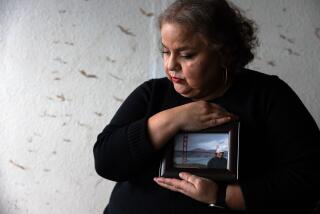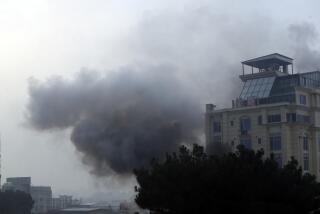Man Renews 20-Year Battle for Citizenship
- Share via
A man at the center of a long-running immigration legal fight that came to be known as the “L.A. 8” case returned to court Tuesday to renew his two-decade-long quest for citizenship.
Aiad Barakat, 45, walked with a pronounced limp to the witness stand in federal court downtown and in halting English fielded a barrage of questions in a bid to avoid deportation.
Almost 20 years ago, federal officials sought to deport Barakat and seven others because of their association with causes promoting Palestinian statehood, such as the Popular Front for the Liberation of Palestine.
The eight were never accused of an act of terrorism or of any other crime.
Rather, they were targeted for deportation on the grounds that they allegedly had raised money for the Popular Front, a group the government suspected of terrorist activities.
The group won a victory in 1989 when a judge struck down as unconstitutional portions of a federal law that allowed deportation to be based on political affiliation and advocacy. The charges against the L.A. 8 have been reworked at least three times since, reflecting changes in immigration and anti-terrorism laws, some of which were tailored to be applied retroactively to this case.
Constitutional questions are not at issue in the current case. The only question in court Tuesday was whether Barakat should be denied citizenship for allegedly lying about his association with Palestinian advocate Ali Kased when he sought U.S. citizenship.
The government plans to introduce an FBI surveillance videotape of a meeting Barakat attended with Kased, described as a prominent Palestinian activist, in 1985 outside of Los Angeles. The meeting purportedly lasted two hours and dealt with Palestinian causes and fundraising.
“Mr. Barakat gave false testimony to obtain an immigration benefit, and thus he is not a person of good moral character,” the government asserted in court papers.
Barakat’s lawyers insist he had a right to engage in political activity and said he may not have remembered the meeting when questioned by immigration officials. U.S. District Judge Steven V. Wilson is presiding over the case, which is scheduled to continue today.
More to Read
Sign up for Essential California
The most important California stories and recommendations in your inbox every morning.
You may occasionally receive promotional content from the Los Angeles Times.













